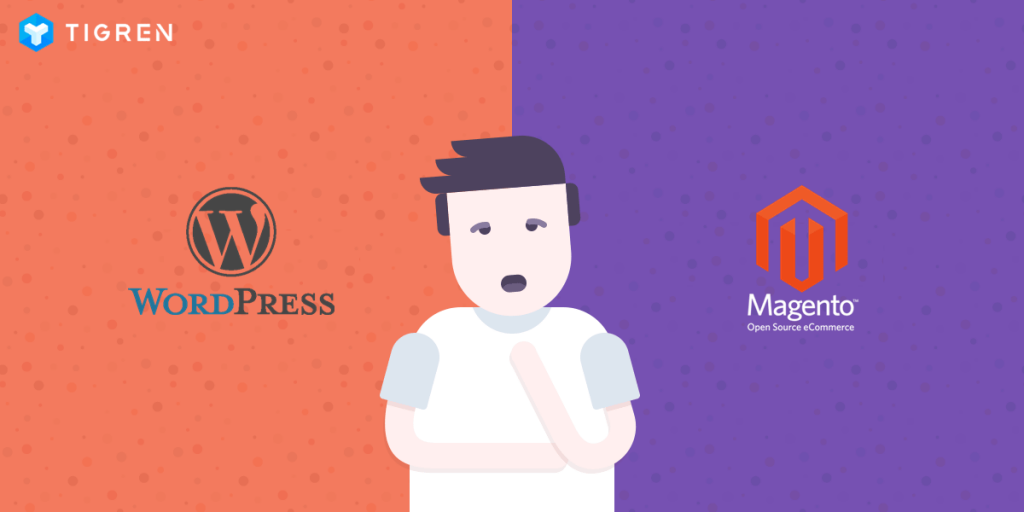Ever felt lost choosing the right tool to build your website or online store?
This question bugs many when they’re starting out or looking to grow online. Imagine Magento and WordPress as two different paths in the world of websites and online shopping. Each path has its own set of signposts and hurdles. And the path you pick can really shape your journey in the digital world.
In this guide, we’re going to put Magento vs WordPress side by side. Think of it like a map that shows you what each path offers. This comparison will help you see which platform might be the best fit for you. So without further ado, let’s dive in!
What is Magento?

Magento (now Adobe Commerce) is a highly flexible and powerful eCommerce platform that gives businesses the ability to create and manage their online stores. It’s known for its scalability, customization, and advanced features, making it a popular choice for businesses of all sizes, from small startups to large enterprises.
Launched in 2008, Magento has emerged as a leading platform for e-commerce website development. Trusted by global giants like Samsung, Ford, and Nike, Magento offers a flexible and feature-rich environment tailored for online retail.
Pros
- Customizability: Imagine Magento as a blank canvas waiting for your creative touch. The platform offers limitless possibilities for customization, allowing you to craft intricate product displays and sophisticated shipping options. It can mold itself to fit your business’s unique needs and brand identity.
- Scalability: As your business expands, so does Magento. Picture your store as a living entity; as it attracts more customers and expands its product line, Magento’s robust architecture supports this growth seamlessly. It’s akin to a building that adds rooms and floors to accommodate more guests.
- Advanced Features: Magento doesn’t stop at basic functionalities. It’s equipped with high-end tools for customer segmentation, detailed analytics, and personalized shopping experiences. These features help you understand your market, streamline operations, and boost sales, arming you for any challenge in the e-commerce arena.
Cons
- Complexity: Magento’s vast array of features can be overwhelming, especially for those new to web development. The platform’s depth, while advantageous, comes with a steep learning curve.
- Cost Considerations: While Magento Open Source offers a cost-effective start, the Adobe Commerce version can be a significant investment. Additionally, Magento’s complexity often necessitates professional development and hosting services, adding to the total cost.
- Resource Intensive: Magento, much like a high-performance vehicle, requires the right infrastructure to function optimally. This means investing in dedicated or cloud hosting services, which, while providing the necessary resources, can be costly and require regular maintenance.
What is WordPress?

WordPress is a popular web content management system (CMS), meaning it’s a tool that makes it easy to create and manage the content of your website without needing to know how to code.
Launched in 2003, WordPress has become the most widely-used website platform, powering over 40% of all websites on the Internet. WordPress’s fame extends beyond the technical sphere, making it a household name in website creation.
While primarily known for its blogging prowess, WordPress has evolved to support a diverse range of website types. From forums and media galleries to e-commerce stores, WordPress can handle it all.
Pros
- Ease of Use: WordPress is renowned for its simplicity and intuitiveness. This ease of use makes it an ideal choice for both beginners and those with some experience in web development.
- Community Support: With millions of users and developers, help is always just a post or a forum away. This community acts as a dynamic support system, offering assistance, advice, and a wealth of shared knowledge.
- Themes and Plugins: Themes and plugins in WordPress are comparable to an extensive wardrobe for your website, offering endless possibilities for customization. With a vast array of options, changing your site’s appearance and adding new functionalities is as easy as changing clothes.
Cons
- E-commerce Capabilities: WordPress is versatile, much like a Swiss Army knife, but it’s not primarily an e-commerce tool. While it can accommodate online stores through plugins like WooCommerce, it might lack the specialized functionality of a dedicated e-commerce platform like Magento.
- Security: WordPress’s popularity makes it an attractive target for cyber threats, similar to a crowded place drawing the attention of pickpockets. However, with regular updates, strong security measures, and vigilance, maintaining a secure WordPress site is very much achievable.
- Performance: Overloading a WordPress site with excessive plugins or poorly designed themes can slow it down, much like an overpacked backpack. Striking a balance between functionality and performance is key to maintaining a fast, efficient site.
Magento vs WordPress: Cost

When choosing between Magento and WordPress for your website, understanding their cost structures is crucial. Both platforms offer different editions tailored to various needs, each with its unique pricing.
Magento provides two distinct editions, catering to a range of business sizes, from small startups to large enterprises, each with its own cost implications.
- Magento Open Source: This is the free version of Magento, perfect for those who are cost-conscious. However, even though the software itself is free, setting up and hosting it isn’t.
- Adobe Commerce: For businesses looking for more advanced features and cloud hosting, Adobe Commerce, the paid version of Magento, is the way to go. The annual license fee starts at $25,000 and varies based on your store’s Gross Merchandise Value and Average Order Value. This option is ideal for large-scale e-commerce operations that need a robust, feature-rich platform.
WordPress presents a versatile solution, offering editions that range from basic to advanced, each scalable to match the growing needs of your business.
- WordPress.org: The free, self-hosted version of WordPress, WordPress.org, offers full customization and all the necessary features to build a website.
- WordPress.com: This is a managed SaaS version, offering different plans for different types of customers. This plan is suitable for those who prefer a managed service with less technical involvement.
- WordPress VIP: Catering to enterprise-level needs, WordPress VIP provides premium hosting, enhanced security, and advanced features. The pricing starts at $25,000 per year, with variations based on monthly traffic, support needs, and applications. This option is best for large businesses that require extensive support and scalability.
Apart from the basic platform costs, both Magento and WordPress might incur additional expenses for premium themes, plugins, and developer services. Generally, the costs for these additional resources tend to be lower on WordPress than Magento, making WordPress a more budget-friendly option for businesses that require a lot of customization but have a tighter budget.
Magento vs WordPress: Features

When it comes to choosing a platform for your e-commerce or content management needs, understanding the distinct features of Magento and WordPress is essential. This section will explore the unique capabilities each platform offers, helping you decide which aligns best with your project requirements.
Magento stands out as a platform shaping modern online shopping experiences. Its features are geared towards creating a dynamic and efficient e-commerce environment.
- Marketing, Promotions, and Conversion Tools: Magento excels in enhancing marketing efforts and conversion rates. Features like upselling, cross-selling, catalog promotional pricing, and flexible coupon management are designed to boost sales and average order values.
- Catalog Management: The platform boasts extensive catalog management tools. This includes versatile product displays, unlimited product attributes, dynamic inventory management, sophisticated pricing mechanisms, and optimized search experience.
- Order Management: The platform provides comprehensive control over order management, including flexible invoicing, shipment, and an enhanced call center integration for phone order creation.
WordPress is renowned for its simplicity and flexibility, catering to a wide range of website types beyond just blogging.
- Publishing Tools: The platform offers straightforward content creation and management tools, including drafts, scheduling, and post revisions. Its user management system is robust, catering to different levels of access and roles.
- Media Management: WordPress simplifies media uploads with drag-and-drop functionality and provides basic image editing tools.
- Data Ownership and Community Support: WordPress emphasizes data ownership, ensuring you have full control over your content. It also boasts a large and active community for support and development.
In summary, Magento offers an array of features specifically tailored for e-commerce, focusing on marketing, site management, and customer engagement. In contrast, WordPress provides a more general yet flexible platform, ideal for content management and customizable websites, with a strong emphasis on user-friendliness and community support.
Magento vs WordPress: SEO

Both Magento and WordPress offer robust SEO capabilities, but they approach SEO in slightly different ways. Understanding these differences can help you choose the right platform for your SEO needs.
Magento 2 offers comprehensive SEO features designed to optimize e-commerce websites effectively.
- Meta Tags and SEO-friendly URLs: Magento 2 allows for the customization of meta tags for products, catalogs, and the home page. It also generates SEO-friendly URLs for products and categories, enhancing search engine visibility.
- Fields Auto-Generation: A notable feature in Magento 2 is the auto-generation of fields for product metadata. This saves time, especially for sites with extensive product catalogs. Individual product pages can override these settings for customized titles and descriptions.
- Canonical Tags and Rich Snippets: The use of canonical tags prevents duplicate content issues. Additionally, Magento 2 integrates with Schema.org for rich snippets, enhancing visibility in search results.
WordPress.com includes built-in SEO tools that cater to a wide range of websites, including blogs, portfolios, and business sites.
- Custom Titles & Descriptions: WordPress.com makes it easy to edit page titles and descriptions, crucial for making a strong first impression in search engine results pages (SERPs).
- Clean URLs: WordPress.com maintains clean and intuitive URLs for all pages, including blog posts and category pages, aiding both user navigation and search engine categorization.
- Access to Popular SEO Plugins: On certain plans, WordPress.com users can access a range of SEO plugins for even more advanced SEO tools and capabilities.
Both platforms can effectively support your SEO strategy, but your choice may depend on the complexity and focus of your website’s SEO needs.
Magento vs WordPress: Security

WordPress, being the more popular platform, faces more security threats. However, the core WordPress software typically isn’t the weak point. According to the Sucuri Hacked Website Threat Report 2022, 49.8% of WordPress sites compromised had outdated installations at the point of infection.
The WordPress Security Team actively works to fix issues in the core software. Regularly updating your WordPress installation, themes, and plugins is crucial to maintaining security. Additionally, choosing reputable sources for plugins and themes and using strong passwords (with two-factor authentication, if available) significantly enhances security.
Magento 2, particularly focusing on e-commerce, offers a suite of security features tailored to protect online transactions and customer data. As an e-commerce platform, Magento 2 adheres to Payment Card Industry Data Security Standards (PCI DSS), ensuring secure handling of credit card data.
Similar to WordPress, Magento’s security can be compromised by third-party extensions. Timely application of Magento security patches is vital, along with virtual patching and using a web application firewall as interim solutions.
Magento vs WordPress: Scalability

Magento 2 stands out for its inherent scalability, especially in the e-commerce domain.
Magento’s database is designed to be scalable. Its core structure is adaptable and modular, allowing developers to easily manage different parts of the database. This means that as your online store grows, Magento can handle the increasing data without performance issues.
Being an open-source platform, Magento has a vast array of third-party extensions. Unlike some platforms where extensions can become a bottleneck as the store grows, Magento’s extensions are built to scale with the platform, thanks to its modular framework.
WordPress, while inherently scalable, often requires additional optimizations and integrations, especially for high-traffic and content-rich sites. Implementing advanced caching mechanisms and reverse proxies is essential for WordPress sites with high traffic. These tools help in managing server load effectively and ensuring smooth site performance.
Magento vs WordPress: User Friendliness

WordPress is renowned for its user-friendly interface, making it a popular choice for those with basic computer skills. Its simplicity in design and functionality makes it accessible for non-developers.
Publishing content on WordPress, like blog posts, is straightforward. The interface is intuitive, much like popular word processors, allowing most users to quickly adapt without any coding knowledge.
While launching a basic WordPress site can be quick, diving into more complex aspects, such as utilizing advanced themes or multiple plugins, requires a learning curve. Users often need to consult tutorials to fully harness the platform’s capabilities.
Magento, while powerful, is known for being less user-friendly, especially for beginners or those without development skills.
Magento’s complexity often poses challenges for end users. It’s not uncommon for users to encounter difficulties, making it less than ideal for those who are not tech-savvy. Effectively using Magento, especially for e-commerce purposes, typically requires development skills or the need to hire a developer. This is due to its intricate architecture and advanced features.
Which Platform Should You Choose?
Deciding between Magento and WordPress for your online presence depends on various factors, including your specific needs, technical expertise, and long-term business goals. Here’s a guide to help you make an informed decision:
1. Consider Your Business Size and Scope
- Magento: Best suited for medium to large businesses that require a robust and scalable e-commerce solution. If your primary focus is on expanding your online store with a need for advanced e-commerce features and customization, Magento is your go-to platform.
- WordPress: Ideal for small to medium-sized businesses, bloggers, or those looking to create a content-focused website. If you need a user-friendly platform with simplicity in content management and a moderate level of e-commerce functionality, WordPress is a strong contender.
2. Technical Skills and Resources
- Magento: Requires a higher level of technical skill or the willingness to hire a developer. It’s a complex platform, but its advanced capabilities are well-suited for a business that needs a comprehensive online store.
- WordPress: With its intuitive interface and ease of use, WordPress is more accessible to those without extensive technical knowledge. It’s a great option for users who want a straightforward approach to website management.
3. Budget Considerations
- Magento: Can be more expensive due to hosting requirements, the need for professional development, and potential costs associated with Magento’s paid version (Adobe Commerce). Ideal for businesses that are ready to invest in a premium e-commerce solution.
- WordPress: Generally more budget-friendly, especially when considering the costs for themes, plugins, and development. WordPress offers a cost-effective solution for businesses with a tighter budget.
4. SEO and Marketing Needs
Both platforms offer robust SEO capabilities, but your choice depends on how these features align with your marketing strategies. Magento’s SEO features are geared more towards e-commerce optimization, while WordPress offers a wide range of SEO plugins suitable for various types of websites.
5. Scalability and Future Growth
- Magento: Offers superior scalability options, making it a future-proof choice for growing businesses that anticipate a significant increase in products or traffic.
- WordPress: Scalable to a certain extent, but may require additional optimization for handling very high traffic or content-heavy sites.
6. Security Considerations
Both platforms require diligent security practices, including regular updates and the use of secure plugins or extensions. Magento provides robust security features needed for e-commerce, while WordPress demands more attention to security due to its popularity and vast use.
7. User-Friendliness
- Magento: Offers powerful functionality but has a steeper learning curve and may require developer assistance.
- WordPress: Known for its ease of use, making it more suitable for beginners or those who prefer a more straightforward content management system.
Evaluate your priorities and choose the platform that best aligns with your vision and operational capacity.

